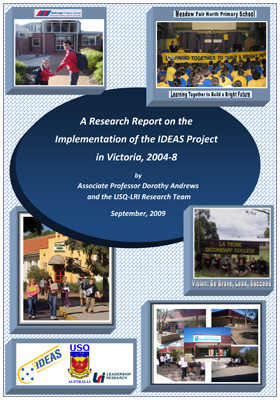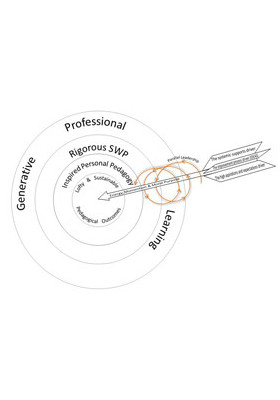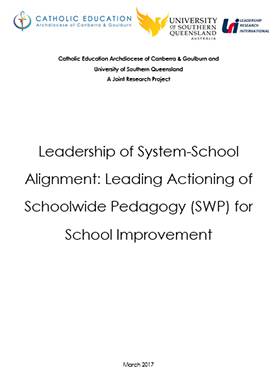This book represents 20 years of Research and Development activity by researchers of the Leadership Research International (LRI) group at the University of Southern Queensland (USQ), Australia, as they have worked with schools and researched processes of school improvement. It represents a unique partnership between University educators and schools and systems across Australia and internationally. The school improvement project, Innovative Designs for Enhancing Achievements in Schools (IDEAS), has been developed by school and university-based researchers working together to make meaning of the complex processes for school improvement. For further information re the purchase of this book, contact Marlene Barron.
IDEAS - THE Way to Sustainable School Improvement (2nd ed.)
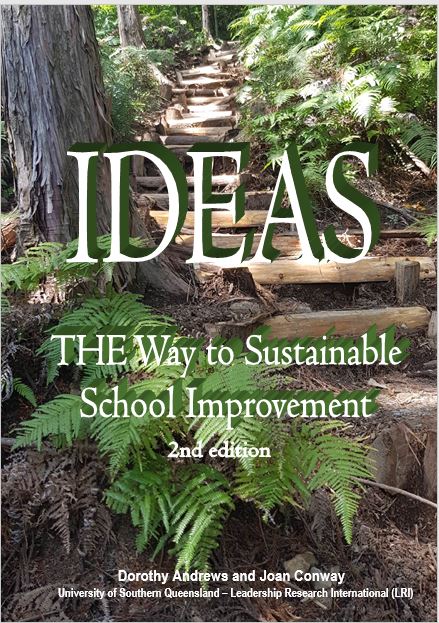
Time to Talk - The LRI Handbook for Facilitating Professional Conversation
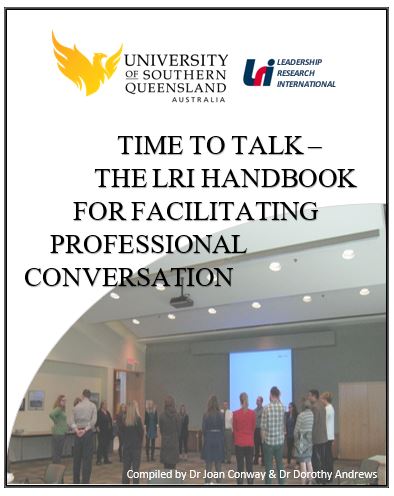
Well designed and facilitated professional conversations provide the means for collective learning through the development of shared meaning and the creation of new (contextualised) professional knowledge. Through these processes of deliberation, each person is able to make their contribution, their expectations are coordinated and the basis for collaborative action is formed. For further information re the purchase of this book, contact Marlene Barron.
Schoolwide Pedagogy: Vibrant new meaning for teachers and principals
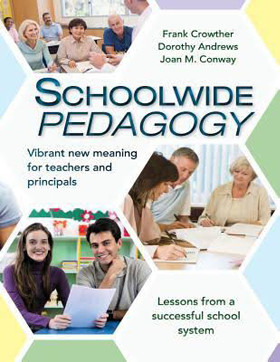
The idea of schoolwide pedagogy (SWP) is a relatively new phenomenon, and here, thanks to researchers at the Leadership Research Institute at the University of Southern Queensland, is a brand-new title to help you understand this exciting teacher-friendly concept better.
Introducing the background of SWP through personal recollections, you’ll learn about the specific criterion and principles that characterise SWP, as well as discover how it has been used in research within primary and secondary schools of the Sydney Catholic Education Office. Along with the two well-documented case studies from two different schools, showing exactly how the concept and ideas of SWP can be applied in a real-life setting, you’ll also learn about the more specific ideas behind the schoolwide pedagogy concept.
This book’s multiple messages of inspiration and practical pedagogical approaches will serve as motivation for any teacher, principal or school community that wants to revitalise their school outcomes.
From School Improvement to Sustained Capacity: The parallel leadership pathway
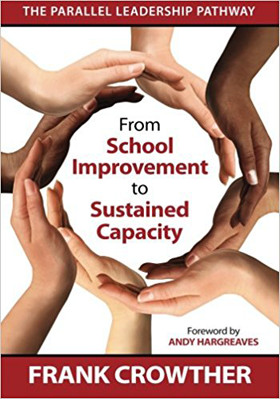
This book contains everything you need, to build a successful and sustainable plan that is rooted in enduring principles. Bestselling author Frank Crowther makes a compelling case for capacity building and parallel leadership as the keys to ensuring sustainable improvement. Based on a recent research study that examined how school leaders collaborated to enhance quality in their workplaces, this book: includes practical examples and proven tools; outlines six research-based dynamics for accomplishing lasting results; provides real-life examples of successful parallel leadership among administrators, teachers and students; demonstrates effective capacity building in a variety of settings with case studies and simulations.
Developing Teacher Leaders, Second Edition
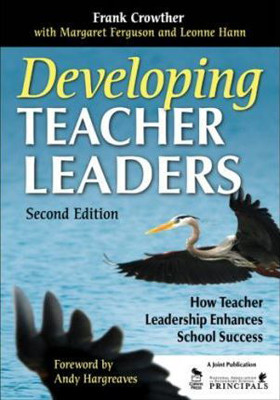
This work helps readers rediscover the importance of teacher leadership in revitalising schools! Teacher leadership is a transformative process that can drive school and community reform. This revised edition of the groundbreaking bestseller builds on current research to help teachers and administrators work together to foster, develop and support teacher leadership. Principals and staff developers will learn how collaborating with teacher leaders can result in significantly improved school outcomes. With the ‘Teachers as Leaders Framework’, teachers can become leaders who facilitate communities of learning, strive for pedagogical excellence, confront barriers and nurture a culture of success.
A Research Report on the Implementation of the IDEAS Project in Victoria, 2004-8
The research that provides the basis for this report derives from the implementation in Victorian schools of the IDEAS Project, a school revitalisation initiative that was developed initially by the Leadership Research Institute (LRI), University of Southern Queensland, and Education Queensland across the period 1997-2004. The IDEAS Project has subsequently been implemented in five Australian education systems, including the Victorian State system, and refined with each new iteration.
The research problem that guided the research was as follows:
What key lessons for enhanced educational achievement can be learned from the implementation of the IDEAS Project in a selection of Victorian schools, 2004-8?
Hitting the Bullseye of School Improvement: The IDEAS Project at work in a successful school system
Many comprehensive approaches to successful school improvement have emerged over the past decade, thus ensuring that school improvement need no longer be a ‘hit and miss’ affair. But the reconceptualisation of successful organisational improvement in educational contexts nevertheless remains seriously unfinished business. It is this ‘unfinished business’ that this article reports on. It does so by describing the contributory processes, and outcomes, associated with a ‘new paradigm’ (or ‘Fourth Way’) educational improvement project (the IDEAS Project) at work in schools in a highly successful school system – Sydney Catholic Education Office.
The research looks in particular at schools in Sydney CEO that achieved substantial growth in NAPLAN results in the period 2006-2010. It is concluded from analysis of the experiences of the schools in question that sustained success in student achievement requires ‘multiple leadership sources’, encompassing system, school and developmental project leadership constructs and processes.
The concluding section of the article makes use of a well-known literary device – metaphor – to capture and communicate the essential findings of the research. Specifically, the field of archery, incorporating arrows and target, is used to demonstrate how successful school improvement was shown to unfold in the Sydney CEO and its schools.
Leadership of System-School Alignment: Leading Actioning of Schoolwide Pedagogy (SWP) for School Improvement
This research project traced the implementation of a school-based contextual specific pedagogical approach to teaching and learning (SWP) in a school defined priority area for improvement. The study also explored how school leaders use the SWP and meta-thinking to respond authentically to system and broader government requirements.
Wellbeing in Educational Contexts
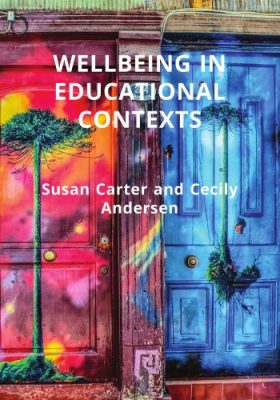
Call for research participants: Wellbeing in Educational Contexts
As part of current research, the authors are calling for participants in a survey designed to improve understanding of wellbeing initiatives that will also inform a revision of parts of this text. You will find further information, and the survey via this link.
The authors, both of whom have been educational leaders and are now current academics, provide both a synthesis of information already in the field as well as a contributing new knowledge to the field. There is increasing understanding that school communities have an important role to play in supporting the wellbeing of both students and staff. Wellbeing in Educational Contexts explores the definition of wellbeing, and investigates how educators can focus on the development of wellbeing from an individual, school community, and structural level. This book provides an opportunity to engage with educational discourse on wellbeing, whilst at the same time addressing issues influencing wellbeing within a school community. The authors present a model “Growing Inclusive Wellbeing” and scaffold how a framework can be developed and include practical templates supporting the development of wellbeing.The book has six chapters, each beginning with a guided question for consideration. Chapter one outlines a possible way of meaning making about wellbeing, building upon prior knowledge and connecting with new knowledge prior to using the text. Chapter two explores a variety of theoretical conceptualisations of wellbeing in order to assist the reader to develop a specific understanding of the concept of wellbeing. The guiding question within this chapter is – what is wellbeing? Chapter three explores policy, frameworks and legislation that have informed the focus on wellbeing. This chapter asks the question – how is wellbeing enacted? Chapter four outlines possible impactors and enablers to wellbeing and raises the guiding question – how is wellbeing enhanced? Chapter five investigates embedding an education wide focus on wellbeing. Here the guiding question is how is wellbeing enacted and embedded? Lastly, the final chapter, chapter six, delves into the ecological and contextual analysis of wellbeing in relation to a workplace wellbeing framework. The guiding question within this final chapter is – how can wellbeing be enacted and promoted in my context? The last chapter also presents practical examples of guiding questions, a checklists and templates that may be of use to schools in unpacking the wellbeing of staff and students within a school community and also a means of evidencing good practice.Schools are a place of social hope, and the growing of inclusive wellbeing supports schools to create teaching and learning environments that enable all within a school community to be healthy, happy, engaged and successful.Access the open book freely via: https://usq.pressbooks.pub/wellbeingineducationalcontexts/
Opening eyes onto inclusion and diversity
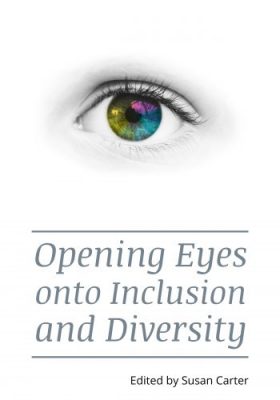
This free textbook explores inclusion, through scenario experiences and reflective analytical activities that develop knowledge of inclusive practices for improving life outcomes for young people. It is an interactive and engaging text weaving new knowledge and existing knowledge into one.
Why Open Text Book Publication?
Our purpose in publishing in the Open Text Book space was to firstly lessen social disparity, reducing for students the costs of educative materials. Our objective was to provide processes that align creativity with innovation and delivery and support productive
experimentation to engage our students in making meaningful understandings of the complexities around inclusion and diversity.
Access: https://usq.pressbooks.pub/openingeyes/
Thank you
The project team would like to acknowledge and thank USQ for funding and for the help of a talented team who provided support for this project, facilitated through the Office for the Advancement of Learning and Teaching.
Help us
If you have used this text, please take the time to answer our survey. The data will help us to understand how the book is being used, and inform future editions.

